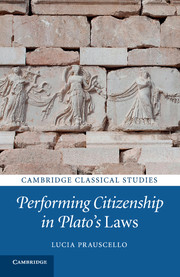Crossref Citations
This Book has been
cited by the following publications. This list is generated based on data provided by Crossref.
2015.
Books Received.
The Classical Review,
Vol. 65,
Issue. 2,
p.
623.
Lynch, Tosca
2017.
The Symphony of Temperance in Republic 4.
Greek and Roman Musical Studies,
Vol. 5,
Issue. 1,
p.
18.
Cohen De Lara, Emma
2017.
The Ethics of Citizenship in the 21st Century.
p.
49.
Bartels, Myrthe L.
2017.
A Discussion of S.S. Meyer, Plato. Laws 1 and 2.
Mnemosyne,
Vol. 70,
Issue. 6,
p.
1059.
Bobonich, Christopher
2017.
The Cambridge Companion to Ancient Ethics.
Bryan, Jenny
2018.
Philosophy.
Greece and Rome,
Vol. 65,
Issue. 2,
p.
269.
Kidd, Stephen E.
2019.
Play and Aesthetics in Ancient Greece.
Isin, Engin
2019.
Performing Citizenship.
p.
45.
Brumbaugh, Michael E.
2019.
THE GREEK ὝΜΝΟΣ: HIGH PRAISE FOR GODS AND MEN.
The Classical Quarterly,
Vol. 69,
Issue. 1,
p.
167.
Flórez, Alfonso
2020.
Dialéctica del esclavo en Platón.
Estudios de Filosofía,
Yu, Kenneth W.
2020.
THE POLITICS OF DANCE:EUNOMIAAND THE EXCEPTION OF DIONYSUS IN PLATO'SLAWS.
The Classical Quarterly,
Vol. 70,
Issue. 2,
p.
605.
Pelosi, Francesco
2020.
A Companion to Ancient Greek and Roman Music.
p.
337.
Weiss, Naomi A.
2020.
A Companion to Ancient Greek and Roman Music.
p.
161.
Camassa, Giorgio
2020.
Soter e soteria dal V secolo alle soglie dell’età ellenistica: qualche considerazione.
Mythos,
Griffith, Mark
2020.
A Companion to Ancient Greek and Roman Music.
p.
379.
Steiner, Deborah Tarn
2021.
Choral Constructions in Greek Culture.
Tronca, Donatella
2021.
To Be or Not to Be Part of the vita scaenica. Religious and Juridical Perspectives on the Status of Dancers and Performers in Late Antiquity.
Mythos,
Reid, Jeremy
2021.
The Mixed Constitution in Plato’sLaws.
Australasian Journal of Philosophy,
Vol. 99,
Issue. 1,
p.
1.
Bartninkas, Vilius
2021.
Imitating the Traditional Gods.
Mnemosyne,
Vol. 76,
Issue. 1,
p.
43.
Hanink, Johanna
2021.
WAS THEPOLISA PERSON IN CLASSICAL ATHENS? CIVIC BODIES AND CHORAL POLITICS IN THE THEATER.
Ramus,
Vol. 50,
Issue. 1-2,
p.
145.



